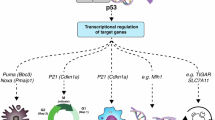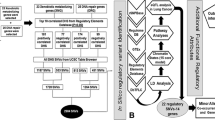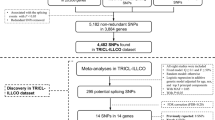Abstract
The tumor suppressor gene, TP53, is located on chromosome 17p13.1 and is critical for DNA repair, cell-cycle control, and apoptosis. TP53 also plays a crucial function in the tumorigenesis of lung cancer. Inactivation of TP53 via genetic alterations such as missense mutations is often associated with lung cancer. In this study, potential association of TP53 polymorphisms with the risk of lung cancer was examined in a Korean population. A total of 299 Korean lung cancer patients and 296 control subjects were recruited into this study. Direct DNA sequencing and TaqMan analysis were employed, and logistic regression analyses were conducted to characterize the association between TP53 polymorphisms and lung cancer risk. Through direct sequencing in 24 Korean individuals, 13 sequence variants were identified, and five of these polymorphisms were selected for a larger-scale genotyping (n = 595). Statistical analyses revealed that polymorphisms and haplotypes in the TP53 gene, including Arg72Pro, were not significantly associated with lung cancer in a Korean population.
Similar content being viewed by others
Log in or create a free account to read this content
Gain free access to this article, as well as selected content from this journal and more on nature.com
or
References
de las Penas R, Sanchez-Ronco M, Alberola V, Taron M, Camps C, Garcia-Carbonero R, Massuti B, Queralt C, Botia M, Garcia-Gomez R, others (2006) Polymorphisms in DNA repair genes modulate survival in cisplatin/gemcitabine-treated non-small-cell lung cancer patients. Ann Oncol 17(4):668–675
Fuster JJ, Sanz-Gonzalez SM, Moll UM, Andres V (2007) Classic and novel roles of p53: prospects for anticancer therapy. Trends Mol Med 13(5):192–199
Hainaut P, Hollstein M (2000) p53 and human cancer: the first ten thousand mutations. Adv Cancer Res 77:81–137
Hazelton WD, Clements MS, Moolgavkar SH (2005) Multistage carcinogenesis and lung cancer mortality in three cohorts. Cancer Epidemiol Biomarkers Prev 14(5):1171–1181
Hedrick PW (1987) Gametic disequilibrium measures: proceed with caution. Genetics 117(2):331–341
Hollstein M, Sidransky D, Vogelstein B, Harris CC (1991) p53 mutations in human cancers. Science 253(5015):49–53
Jin X, Wu X, Roth JA, Amos CI, King TM, Branch C, Honn SE, Spitz MR (1995) Higher lung cancer risk for younger African-Americans with the Pro/Pro p53 genotype. Carcinogenesis 16(9):2205–2008
Kastan MB, Canman CE, Leonard CJ (1995) P53, cell cycle control and apoptosis: implications for cancer. Cancer Metastasis Rev 14(1):3–15
Khadang B, Fattahi MJ, Talei A, Dehaghani AS, Ghaderi A (2007) Polymorphism of TP53 codon 72 showed no association with breast cancer in Iranian women. Cancer Genet Cytogenet 173(1):38–42
Matakidou A, Eisen T, Houlston RS (2003) TP53 polymorphisms and lung cancer risk: a systematic review and meta-analysis. Mutagenesis 18(4):377–385
Mechanic LE, Bowman ED, Welsh JA, Khan MA, Hagiwara N, Enewold L, Shields PG, Burdette L, Chanock S, Harris CC (2007) Common genetic variation in TP53 is associated with lung cancer risk and prognosis in African Americans and somatic mutations in lung tumors. Cancer Epidemiol Biomarkers Prev 16(2):214–222
Nadji SA, Mahmoodi M, Ziaee AA, Naghshvar F, Torabizadeh J, Yahyapour Y, Nategh R, Mokhtari-Azad T (2007) An increased lung cancer risk associated with codon 72 polymorphism in the TP53 gene and human papillomavirus infection in Mazandaran province, Iran. Lung Cancer 56(2):145–151
Nyholt DR (2004) A simple correction for multiple testing for single-nucleotide polymorphisms in linkage disequilibrium with each other. Am J Hum Genet 74(4):765–769
Petitjean A, Achatz MI, Borresen-Dale AL, Hainaut P, Olivier M (2007) TP53 mutations in human cancers: functional selection and impact on cancer prognosis and outcomes. Oncogene 26(15):2157–2165
Pierce LM, Sivaraman L, Chang W, Lum A, Donlon T, Seifried A, Wilkens LR, Lau AF, Le Marchand L (2000) Relationships of TP53 codon 72 and HRAS1 polymorphisms with lung cancer risk in an ethnically diverse population. Cancer Epidemiol Biomarkers Prev 9(11):1199–1204
Popanda O, Edler L, Waas P, Schattenberg T, Butkiewicz D, Muley T, Dienemann H, Risch A, Bartsch H, Schmezer P (2007) Elevated risk of squamous-cell carcinoma of the lung in heavy smokers carrying the variant alleles of the TP53 Arg72Pro and p21 Ser31Arg polymorphisms. Lung Cancer 55(1):25–34
Rajaraman P, Wang SS, Rothman N, Brown MM, Black PM, Fine HA, Loeffler JS, Selker RG, Shapiro WR, Chanock SJ, others (2007) Polymorphisms in apoptosis and cell cycle control genes and risk of brain tumors in adults. Cancer Epidemiol Biomarkers Prev 16(8):1655–1661
Sanchez-Cespedes M (2003) Dissecting the genetic alterations involved in lung carcinogenesis. Lung Cancer 40(2):111–121
Shin HR, Won JY, Jung KW, Kong KW, Yim SH, Lee JK, Noh HI, Lee JK, Pisani P, Park JG (2005) Nationwide cancer incidence in Korea, 1999–2001; first result using the national cancer incidence database. Cancer Res Treatment 37(6):325–331
Soussi T (2007) p53 alterations in human cancer: more questions than answers. Oncogene 26(15):2145–2156
Sozzi G, Pastorino U, Moiraghi L, Tagliabue E, Pezzella F, Ghirelli C, Tornielli S, Sard L, Huebner K, Pierotti MA, others (1998) Loss of FHIT function in lung cancer and preinvasive bronchial lesions. Cancer Res 58(22):5032–5037
Stephens M, Smith NJ, Donnelly P (2001) A new statistical method for haplotype reconstruction from population data. Am J Hum Genet 68(4):978–989
Toloza EM, Morse MA, Lyerly HK (2006) Gene therapy for lung cancer. J Cell Biochem 99(1):1–22
Wistuba II, Gazdar AF, Minna JD (2001) Molecular genetics of small cell lung carcinoma. Semin Oncol 28(2 Suppl 4):3–13
Yokomizo A, Tindall DJ, Drabkin H, Gemmill R, Franklin W, Yang P, Sugio K, Smith DI, Liu W (1998) PTEN/MMAC1 mutations identified in small cell, but not in non-small cell lung cancers. Oncogene 17(4):475–479
Zambetti GP (2007) The p53 mutation “gradient effect” and its clinical implications. J Cell Physiol 213(2):370–373
Zhang X, Miao X, Guo Y, Tan W, Zhou Y, Sun T, Wang Y, Lin D (2006) Genetic polymorphisms in cell cycle regulatory genes MDM2 and TP53 are associated with susceptibility to lung cancer. Hum Mutat 27(1):110–117
Author information
Authors and Affiliations
Corresponding author
Additional information
This work was supported by a grant from the Korea Health 21 R&D Project, Ministry of Health & Welfare, Republic of Korea (A010250), and intramural grants from the Korea National Institute of Health, Korea Center for Disease Control, Republic of Korea.
Electronic supplementary material
Below is the link to the electronic supplementary material.
Rights and permissions
About this article
Cite this article
Jung, HY., Whang, Y.M., Sung, J.S. et al. Association study of TP53 polymorphisms with lung cancer in a Korean population. J Hum Genet 53, 508 (2008). https://doi.org/10.1007/s10038-008-0278-y
Received:
Accepted:
Published:
DOI: https://doi.org/10.1007/s10038-008-0278-y
Keywords
This article is cited by
-
Association of p53 codon 72 polymorphism and survival of North Indian lung cancer patients treated with platinum-based chemotherapy
Molecular Biology Reports (2016)
-
Association between the TP53 polymorphisms and lung cancer risk: a meta-analysis
Molecular Biology Reports (2014)
-
The Association Between TP53 Arg72Pro Polymorphism and Lung Cancer Susceptibility: Evidence from 30,038 Subjects
Lung (2013)
-
P53 codon 72 Arg/Pro polymorphism and lung cancer risk in Asians: an updated meta-analysis
Tumor Biology (2013)
-
P53 codon 72 polymorphism and lung cancer risk: evidence from 27,958 subjects
Tumor Biology (2013)



